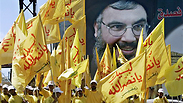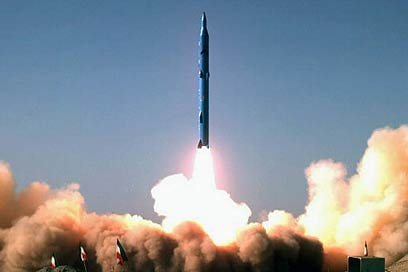
The real Iranian threat
Analysis: While world's eyes were focused on nuclear talks, Iran expanded its penetration and influence in Middle East. An Iran with a considerable ability to threaten Israel from Lebanon and Syria is the significant strategic issue Israel and moderate Arab states must tackle together with US.
The person who exposed the secret nuclear program to the world and developed the nuclear threat strategy as the main component of Iran's foreign relations was President Mahmoud Ahmadinejad. He realized that even if Iran would not reach a nuclear weapon during his term, the actual threat of developing such a weapon was the real weapon.
In August 2006, Ahmadinejad revealed the heavy water reactor in Arak, a move which prompted the Security Council to expand the sanctions against Iran, but also improved the country's diplomatic standing and turned Ahmadinejad into an influential international figure.
Israel's concern over the project's development was understandable, but its activities were conducted secretly and in coordination with the Americans. At a certain stage, the program turned into a political axe in the hands of Prime Minister Benjamin Netanyahu. That way, Israel largely played right into the hands of the Iranian policy, which succeeded in boosting its image.

The Israeli pressure and the military threat through the "hold me back" approach had a great contribution to the increased sanctions against Iran, but at the same time they also increased Iran's power, and the Islamic Republic translated the international eagerness to reach an agreement in favor of boosting its terror-supporting activity in the region.
While the world's eyes were focused on the nuclear negotiations, Iran expanded its penetration and influence in the Middle East. Within three years it gained almost full control in Iraq, became the main supporter of the remains of the Assad regime in Syria, not to mention Hezbollah which has been controlling Lebanon for more than two decades.
Most importantly, Iran's moves in Yemen demonstrate the strength of the status it has obtained as a nuclear threshold country. Iran's open support for the Houthis in Yemen and its activity against the Saudis are clear evidence of its self-confidence on the backdrop of the American pressure to reach a nuclear agreement.
Iran of exporting the revolution and regional terror is much more dangerous here and now than a (potentially) nuclear Iran in 15 years from now. An Iran gaining a considerable ability to threaten Israel from Lebanon and Syria is the significant strategic issue which Israel and the moderate Arab countries must thwart together with the Americans.
But the nuclear bedazzlement has generated an opposite cooperation – cooperation between Iran and the Americans and Europeans. The Iranian expansion is being handled by the Saudis and Egyptians on their own.
There is no one in Israel who thinks the nuclear agreement is a good agreement, but the discussion should not focus on that. Because this agreement is the best among all other alternatives, and any military strike – as successful as it may be – would not have delayed even 20% of what the agreement will delay, not to mention the risk of another flare-up with Hezbollah, which an operation against Iran would have generated. The agreement is an established fact, and it's not particularly bad as far as Israel is concerned.
Israel's real strategic objective is to restore its relationship with the United States, also in order to deal with the Iranian expansion challenge. The secretary of defense's visit next week could serve as a respectable starting point for Israel, both in order to receive American compensation and in order to show some respect to Obama, as this agreement is the significant achievement of his presidency. After all, one of the most important cornerstones of Israel's security is the relationship with the US.
Major-General (res.) Israel Ziv served as head of the Operations Directorate branch in the IDF's General Staff.










